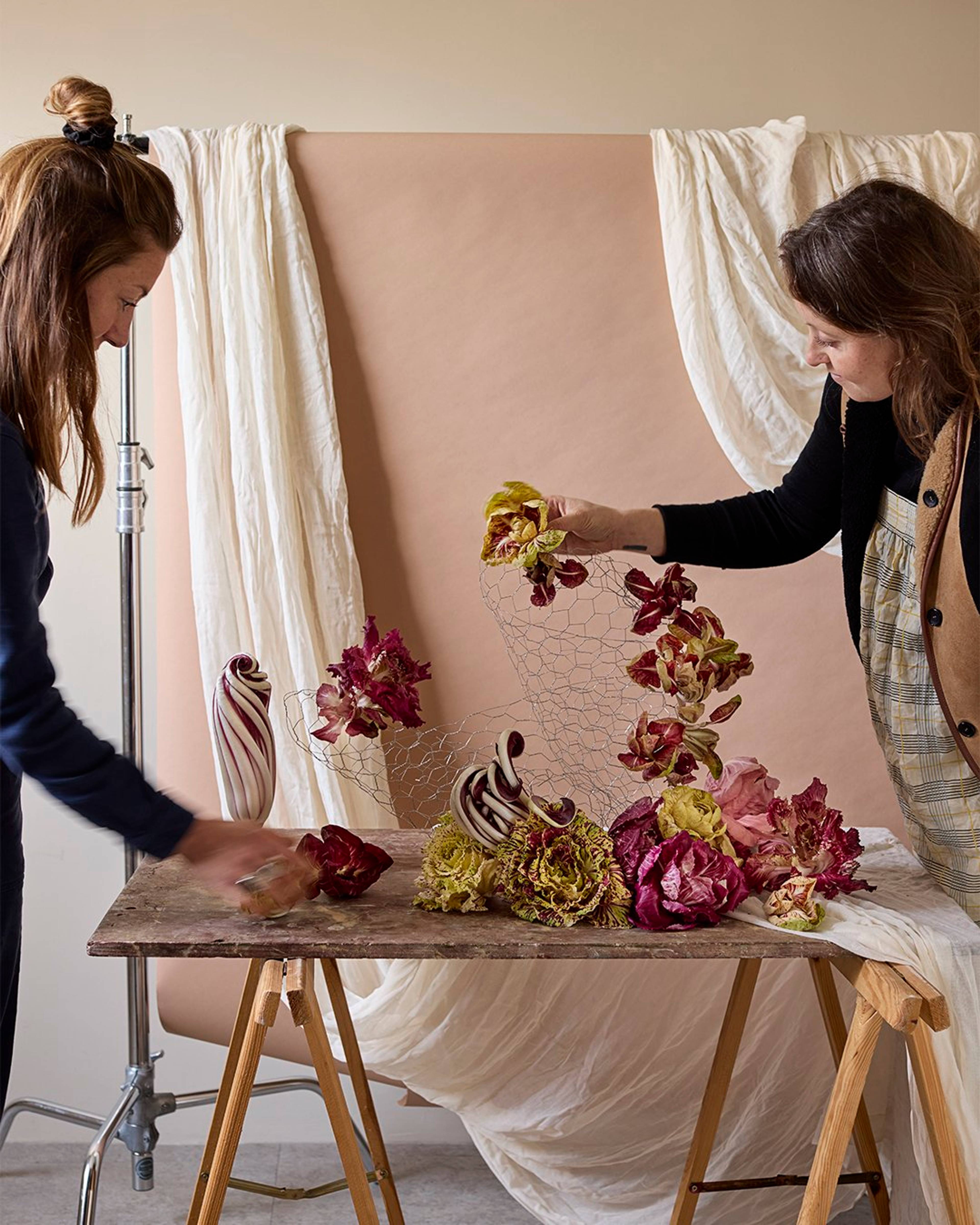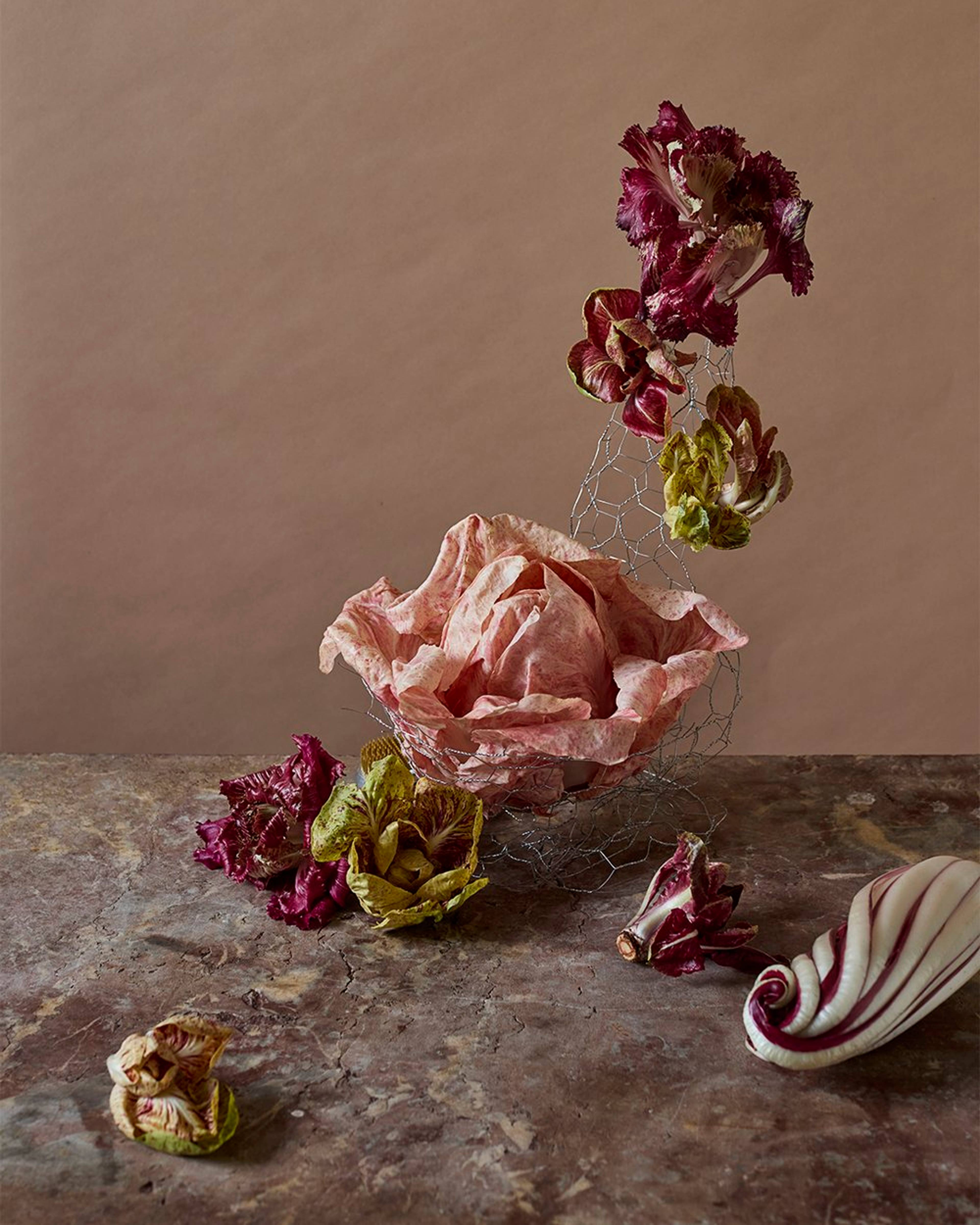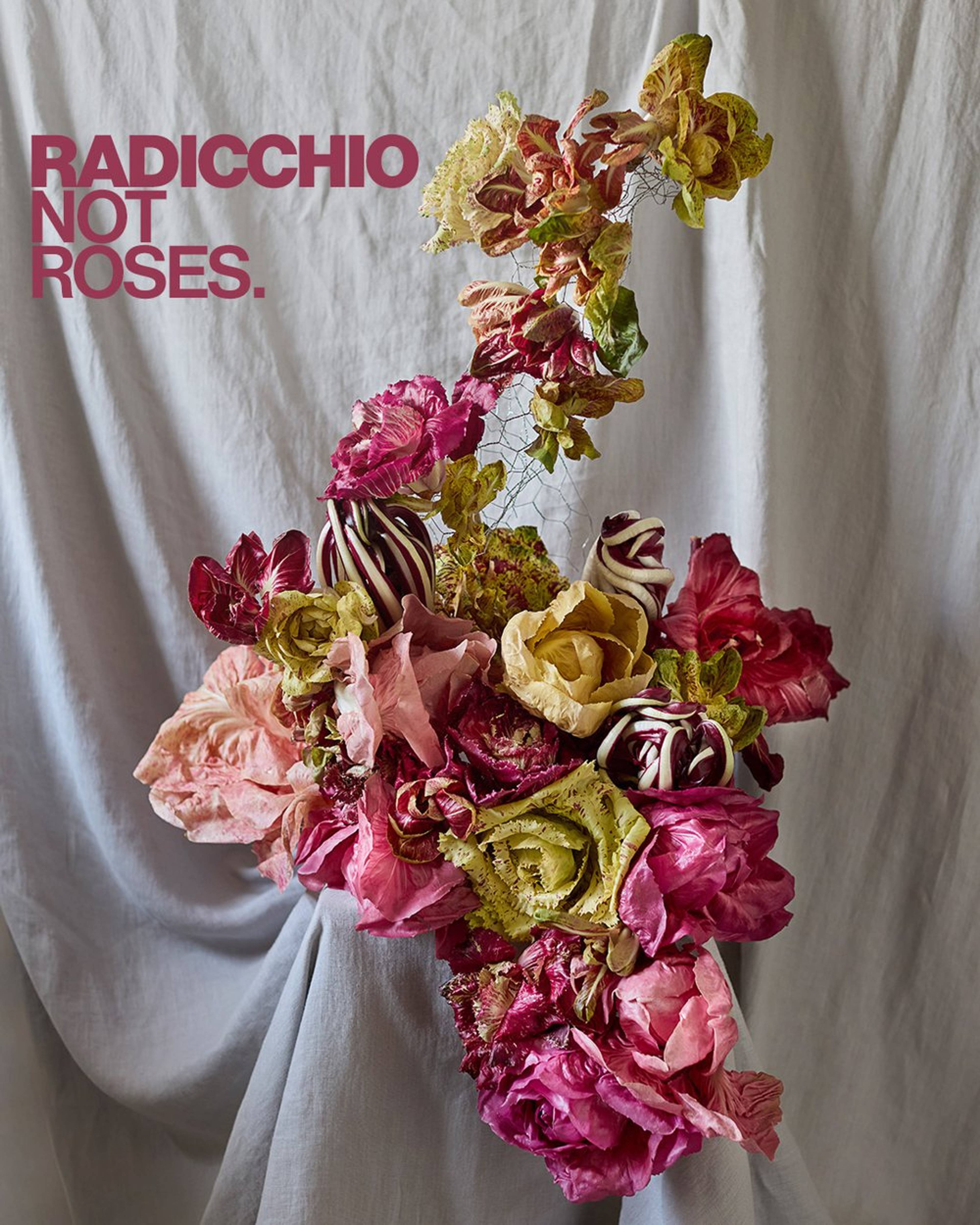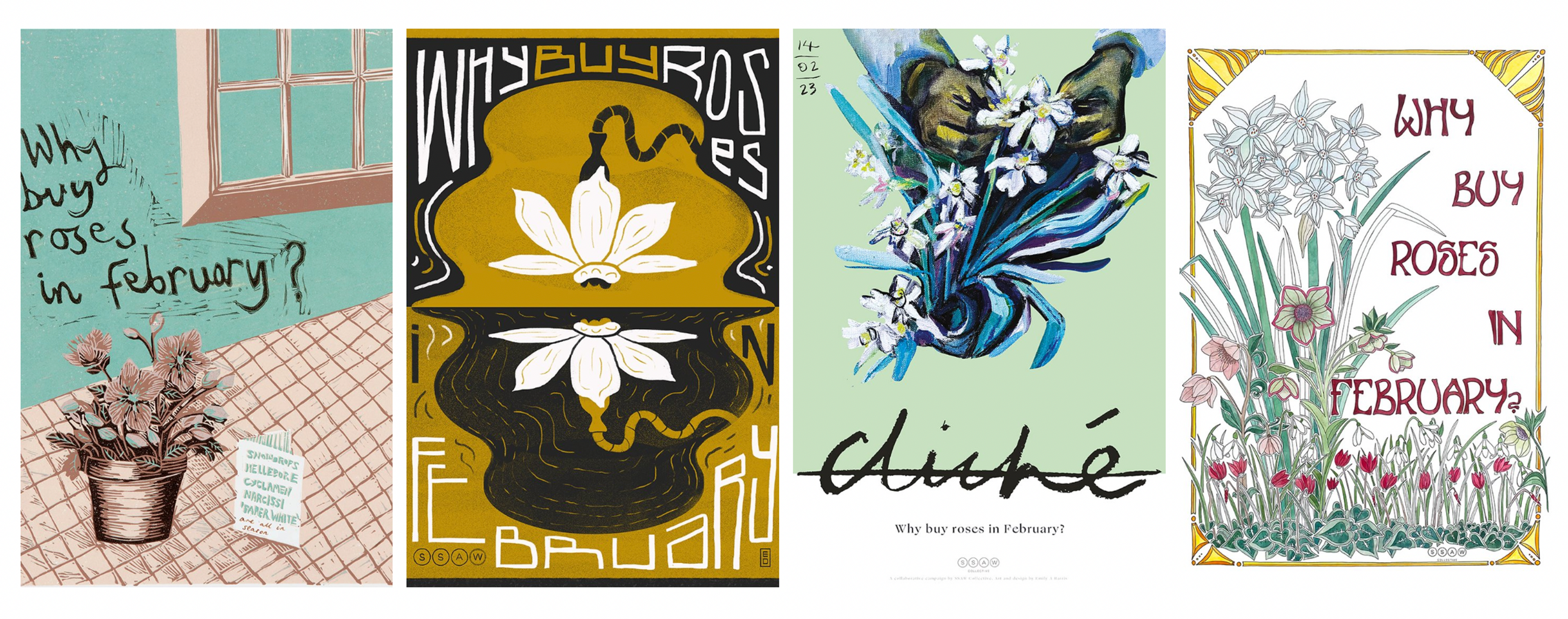IN CONVERSATION WITH SSAW COLLECTIVE

SSAW Collective for Radicchio, not Roses 2023 Campaign

Connect with seasonality, through Valentine's Day. Last year, in the weeks leading up to Valentine’s Day, we urged shoppers to ‘Buy Radicchio, Not Roses’, whilst SSAW Collective — the chefs, florists & growers committed to an ethical way of working with seasonal produce — asked, “Why buy roses in February”?
The power and popularity of these campaigns were monumentally positive. Like SSAW, we have focused on the ecological harm of consumerism around Valentine’s Day for a long time. The upsurge in conversation suggests that our combined concerns are rising to the forefront of modern consciousness and starting to make waves.
Now in their third year of this campaign, what SSAW articulates so eloquently is that they are not trying to call anyone out. This isn’t about boycotting the rose industry. It isn’t even all about Valentine’s Day. Instead, it is about sparking conversations around seasonality that can sway us away from convention to enact lasting change.
Louder together, this year we are joining forces. Today, we talk to Liv and Jess about what it takes to shift a dominant cultural narrative, how we can buy more thoughtfully this Valentine’s Day, and why the beauty of the British landscape is the ultimate key to positivity.

What are the links between romance and Valentine's Day?
Liv: The links between roses and romance or love are really quite expansive. They stretch from Greek mythology and Hindu legend to Shakespearean prose and Victorian floriography. Every culture across the world has these associations, from China to the West. They have permeated our consciousness. We feel them, which is strange because most people today don’t associate with symbolism elsewhere in their lives. Roses are an iconic way of representing love.
What's the harm?
Liv: I think it’s important to accept the responsibility that antiquated cultural ideas are having an impact on people in places that are less equipped to deal with the repercussions. We have a responsibility to ensure that our whims and fancies aren’t affecting places in ways that are unjust, unfair and unnecessary for a luxury product.
The production of roses for Valentine’s Day really does epitomise the kind of consumption that is environmentally and ethically disastrous. You can’t really justify it, I think.
The fact that production is so concentrated around one day puts a lot of pressure on flower farms. Growers are forced to hold flowers back to have them ready for this one day, which means that working hours are particularly concentrated over this period.
“On booming floriculture farms in developing countries there are widespread reports of low pay, long hours, poor working conditions and other systemic abuses of workers’ rights. The intensity and duration of the workers’ hours are compounded by periods of high demand.”
BBC, ‘The 4,000 mile flower delivery’
Shop florists have to spend more money on roses because the price rises to meet demand. At the other end of the scale, you have supermarkets selling incredibly cheap roses, which artificially distorts people’s value perception.
Jess: The prices might go up, but that isn’t going into paying the workers for overtime: that’s what the middlemen will take home for themselves, and it leaves the florist and worker at either end of the supply chain at a lesser advantage.
Liv: There were some really powerful videos that came out last year about pesticide use in growing flowers. It’s important that people have knowledge of the way things are grown, and that regulation needs to be improved.
Why is this not about boycotting roses?
Jess: For some businesses, upholding these traditions is the difference between making a living and not. Many florists will make 40% of their yearly takings in Valentine’s week. When you distil it down, it’s all about how we can divert or spread out our consumption in a way that is still viable for the economy but also makes sense from an ecological point of view.
Liv: You don’t need to ban roses. The system just needs to change and we need to have conversations to help these things happen.
What alternatives would you suggest for Valentine's Day?
Liv: February is limited. Depending on the weather (because it can be difficult for the boats to get over) Narcissi from the Scilly Isles are usually available. There used to be lots of farms, and now there are hardly any left. Supporting home-grown industries is really important, especially as many UK farmers are working hard to grow in more positive ways.
Jess: Climate change is affecting these growers. Cornish Daffodils that are usually available now are two or three weeks away because the dry summer delayed flowering. Instead, farmers are having to grow indoors which costs more for them — costs that they can’t pass onto the wholesaler because consumers won’t pay more than £1 a bunch.
Liv: There’s cyclamen, then there’s hellebore, which you wouldn’t necessarily cut at this time of year, but as a plant they’re beautiful. It’s nice to give a plant that will come back as an enduring token of love. Then snowdrops which — like cyclamen — have associations with love.
Jess: Last year we sold snowdrops in early February from an English grower and only got them right at the last minute, and some of them were only just about to flower. It might be different if you go for a stroll in a woodland where you’ll see clumps of established snowdrops popping up everywhere, but early growth is slow if it’s a new perennial bulb.
Liv: There are beautiful things like witch hazel and winter blossoms, but they depend on immediate climates. There are lots of winter blossoms flowering now, but that’s because it’s so mild. Who knows what the weather’s going to do in the next six weeks. Just think about what you’re choosing…
Jess: And support a small, independent business.
Liv: Or choose dried bunches; there are a lot of florists doing incredible things. Or buy a subscription so they receive flowers throughout the year; delayed presents are always nice — extending the Valentine’s Day love.
At end-of-life, radicchio can be eaten, not wasted. What would you suggest for seasonal flowers?
Jess: Almost everything can be dried or pressed. Hellebore can make beautiful pressed flowers that can later be framed — you don’t need a flower press, you can do it between some heavy books. Make confetti to use at summer weddings — lay the petals out — be sure to separate them so they don’t mould.
Liv: Prolong the life of your flowers by looking after them well: recutting; out of direct sunlight; not somewhere really hot; changing the water as much as you possibly can. And never feel bad about composting; it’s never a waste because they’re returning to the earth to create new life.
How is this campaign a springboard for more holistic change?
Jess: This is not just about Valentine’s, and it’s not just about roses: it’s about seasonality and reconnecting people with that calendar. Valentine’s Day is the obvious conversation starter because it is globally recognised and cross-cultural. It impacts the whole world, whether that’s the consumers or the developing nations that supply most of the roses.
What’s beautiful about being able to offer alternatives is broadening people’s imaginations. In the same way as when we talk about the climate crisis, there is so much hope and positivity around the outcomes of changing your behaviour. The more people talk about that, the more you are inspired to do something differently, like cook a beautiful meal, or give someone a seed packet to sow later in the year.
Change comes from people. All mass changes throughout history come from a deep-rooted need from the population or people grouping together. They say you need 25% of people to change for it to spiral into action. How close are we to getting there with roses? 25% feels like a realistic target.
We’re not losing anything here: we’re gaining beauty by turning things upside down and stepping out of our comfort zone. The change is great: it’s positive. It reveals beauty.
What can the British landscape offer us?
Jess: Creatively we take so much inspiration from the British landscape, but it’s imperative that we recognise that unless we leave it alone, and work on replenishing and regenerating the land, we are at risk of losing the diversity that makes it rich and vibrant. As growers we try to leave 20% of the crops for the bees or birds and let or letting things go to seed.
There’s a stat that one in eight young people, and one in four inner-city children, have never seen a cow in real life. We must open up the doors to the British landscape to show people that the land is for all of us, not just generational farmers.
Liv: The whole concept of ‘Why Buy Roses in February’ is about expanding the possibilities of what February looks like. I hope our floristry encourages people to look at the landscape with different eyes and see beauty in it. That feels important to me. Nature inspires. It allows you to live in the present and see how things change.
Through food and flowers, you can make a profound difference to our sense of well-being. It’s really important because times are really hard right now. We need positivity from nature, we just don’t always have the time to realise that.
“What a wild and mind-bending disco there is on the Earth, if we would only look and take notice!”
Lucy Jones, Losing Eden
What's next?
Jess: We’re excited to see where this campaign goes. We’ve commissioned artists to design our posters this year, which are all so different. We need positivity and people working together to not feel hopeless. We feel energised and keen to join with people and help businesses see the opportunity too. Thinking in ways that are more ecological is a win-win. We have nothing to lose.
Posters will be on sale from 1st February at SSAW Collective, shipping Nationwide & Europe. They are limited edition so get them quick.

www.ssawcollective.com/shop
We exist to fix the food system.
People are more cut off from the origins of their food than ever. This makes flavour, nutrition and farming practices that protect the planet, almost impossible to find.
By working directly with growers, we create a more sustainable way forward for farming. By giving everyone the tools to understand the power of our food choices, we empower everybody to become drivers of change.
Now is the time for action. Join the food system revolution.

Go beyond four seasons
Each fruit and vegetable has its own season, with subtle shifts which happen every day. Follow their microseasons to unlock flavour at every stage.
WHAT’S IN SEASON?

Know where your food comes from
We know the name of the people behind everything we source. Recognise their growing artistry to find out exactly where your food comes from (and why that matters).
MEET THE GROWERS

Make your diet diverse
Our growers work with varieties chosen for quality and nutrition, not yield. By selecting their crops you keep heritage seeds in play, add to ecosystem biodiversity and preserve unique flavours.
PEAK SEASON BOX
United Kingdom
© 2026 Natoora Ltd.